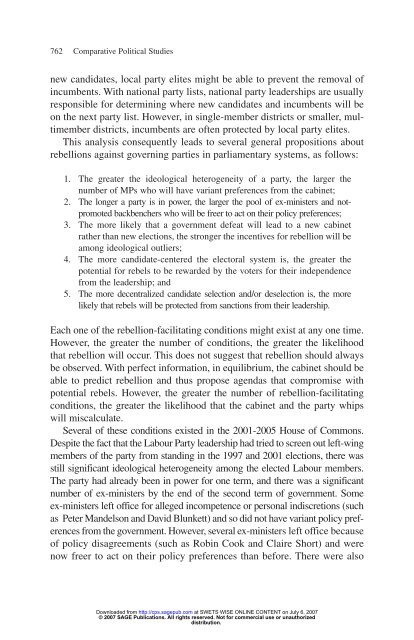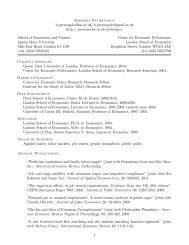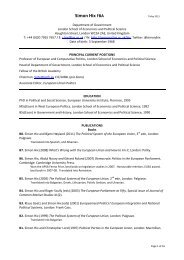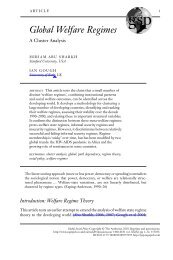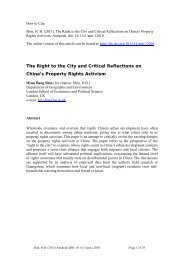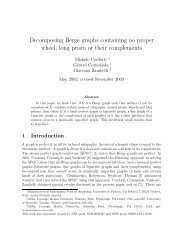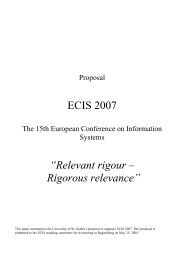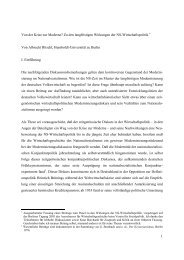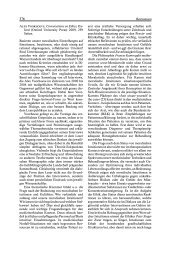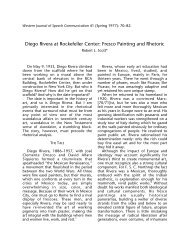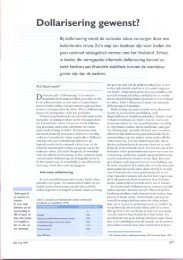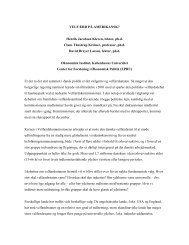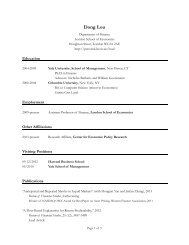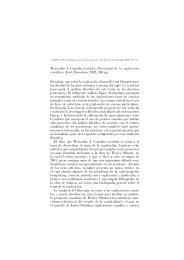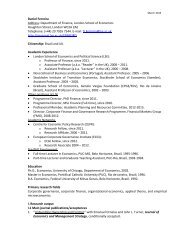The Rejected, the Ejected, and the Dejected: Explaining ...
The Rejected, the Ejected, and the Dejected: Explaining ...
The Rejected, the Ejected, and the Dejected: Explaining ...
Create successful ePaper yourself
Turn your PDF publications into a flip-book with our unique Google optimized e-Paper software.
762 Comparative Political Studies<br />
new c<strong>and</strong>idates, local party elites might be able to prevent <strong>the</strong> removal of<br />
incumbents. With national party lists, national party leaderships are usually<br />
responsible for determining where new c<strong>and</strong>idates <strong>and</strong> incumbents will be<br />
on <strong>the</strong> next party list. However, in single-member districts or smaller, multimember<br />
districts, incumbents are often protected by local party elites.<br />
This analysis consequently leads to several general propositions about<br />
rebellions against governing parties in parliamentary systems, as follows:<br />
1. <strong>The</strong> greater <strong>the</strong> ideological heterogeneity of a party, <strong>the</strong> larger <strong>the</strong><br />
number of MPs who will have variant preferences from <strong>the</strong> cabinet;<br />
2. <strong>The</strong> longer a party is in power, <strong>the</strong> larger <strong>the</strong> pool of ex-ministers <strong>and</strong> notpromoted<br />
backbenchers who will be freer to act on <strong>the</strong>ir policy preferences;<br />
3. <strong>The</strong> more likely that a government defeat will lead to a new cabinet<br />
ra<strong>the</strong>r than new elections, <strong>the</strong> stronger <strong>the</strong> incentives for rebellion will be<br />
among ideological outliers;<br />
4. <strong>The</strong> more c<strong>and</strong>idate-centered <strong>the</strong> electoral system is, <strong>the</strong> greater <strong>the</strong><br />
potential for rebels to be rewarded by <strong>the</strong> voters for <strong>the</strong>ir independence<br />
from <strong>the</strong> leadership; <strong>and</strong><br />
5. <strong>The</strong> more decentralized c<strong>and</strong>idate selection <strong>and</strong>/or deselection is, <strong>the</strong> more<br />
likely that rebels will be protected from sanctions from <strong>the</strong>ir leadership.<br />
Each one of <strong>the</strong> rebellion-facilitating conditions might exist at any one time.<br />
However, <strong>the</strong> greater <strong>the</strong> number of conditions, <strong>the</strong> greater <strong>the</strong> likelihood<br />
that rebellion will occur. This does not suggest that rebellion should always<br />
be observed. With perfect information, in equilibrium, <strong>the</strong> cabinet should be<br />
able to predict rebellion <strong>and</strong> thus propose agendas that compromise with<br />
potential rebels. However, <strong>the</strong> greater <strong>the</strong> number of rebellion-facilitating<br />
conditions, <strong>the</strong> greater <strong>the</strong> likelihood that <strong>the</strong> cabinet <strong>and</strong> <strong>the</strong> party whips<br />
will miscalculate.<br />
Several of <strong>the</strong>se conditions existed in <strong>the</strong> 2001-2005 House of Commons.<br />
Despite <strong>the</strong> fact that <strong>the</strong> Labour Party leadership had tried to screen out left-wing<br />
members of <strong>the</strong> party from st<strong>and</strong>ing in <strong>the</strong> 1997 <strong>and</strong> 2001 elections, <strong>the</strong>re was<br />
still significant ideological heterogeneity among <strong>the</strong> elected Labour members.<br />
<strong>The</strong> party had already been in power for one term, <strong>and</strong> <strong>the</strong>re was a significant<br />
number of ex-ministers by <strong>the</strong> end of <strong>the</strong> second term of government. Some<br />
ex-ministers left office for alleged incompetence or personal indiscretions (such<br />
as Peter M<strong>and</strong>elson <strong>and</strong> David Blunkett) <strong>and</strong> so did not have variant policy preferences<br />
from <strong>the</strong> government. However, several ex-ministers left office because<br />
of policy disagreements (such as Robin Cook <strong>and</strong> Claire Short) <strong>and</strong> were<br />
now freer to act on <strong>the</strong>ir policy preferences than before. <strong>The</strong>re were also<br />
Downloaded from<br />
http://cps.sagepub.com at SWETS WISE ONLINE CONTENT on July 6, 2007<br />
© 2007 SAGE Publications. All rights reserved. Not for commercial use or unauthorized<br />
distribution.


